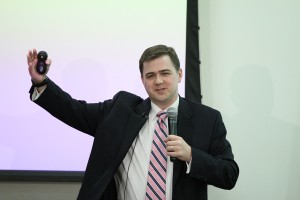Professor discusses role of religion in 2012 election
David Campbell, an associate professor of political science at the University of Notre Dame and co-author of American Grace: How Religion Divides and Unites Us, discussed on Tuesday how American views toward religion in politics have changed since the ’60s and how this could influence presidential contender Mitt Romney’s campaign.
The USC Department of Political Science and Institute for Advanced Catholic Studies hosted Religion in a Time of Politics: Is This the Mormon Moment? Will Mitt Romney Be the Mormons’ JFK? in the Davidson Conference Center.
Campbell shared findings from the study conducted to write American Grace and what elements of political life have changed since John F. Kennedy was elected president.

Faith · David Campbell, an associate professor of political science at the University of Notre Dame, pointed out the increasing role religion has played in presidential elections. - Chris Pham | Daily Trojan
Mormons today face similar problems to Roman Catholics in the ’60s in terms of their perception, Campbell said.
“In 1960 there were a lot of Americans who never had exposure to Catholics,” Campbell said. “Catholics went to different schools and lived in different neighborhoods.”
While Americans like religious diversity, he said, they trust people from another faith when they have a close relationship with someone who practices that faith.
“There is an immense amount of data supporting that Americans get along across religious lines because we have made relationships with people of other religions,” Campbell said. “They have either neighbors, close friends or extended family members of a different religious background.”
Campbell found that those of other religions viewed Jews, Catholics and Protestants most favorably. The least popular were Mormons, Buddhists and Muslims.
“This cannot simply be explained by the size of the group of the population,” Campbell said. “There are as many Mormons in America as there are Jews.”
His study found Mormons are one of the least likely religious groups to interact with those of other religions.
“Mormons are geographically concentrated in the mountainous West,” Campbell said. “They are less likely to have friends and family members in other religions and that works against them.”
Jordan Hatch, a graduate student studying dentistry and a Mormon, said about half of his friends are from his church and half are from school. He said his friends from school are usually not Mormon.
“They say they’ve never met a Mormon and ask me a lot of questions to clarify,” Hatch said. “It’s always been a very positive exchange.”
Campbell’s study found that those who did not know anything about Mormons were likely to look past religion when told about Mormonism, but those who had Mormon acquaintances were not.
“Those who have a Mormon acquaintance — know a Mormon but only in passing — are most likely to have a negative reaction to knowing Romney is a leader in the Mormon church,” Campbell said. “We hypothesize that’s because these folks know there’s something different and distinctive about Mormons but they haven’t been able to forge the close personal connection … that we have done with Catholics and Jews.”
Zade Shakir, a sophomore majoring in international relations and a Muslim, said Campbell’s findings were true for him.
“I have some close friends who are Mormon,” Shakir said. “I really respect their religion.”
Campbell said religion has become partisan, as frequency of religious service attendance is the largest indicator of whether someone is a Republican, which puts Romney in a more difficult situation than Kennedy.
“He can’t stand before an audience like Kennedy did and say, ‘Don’t worry about my religion,’” Campbell said. “We expect our presidential candidates, and especially the Republican base, to discuss their religion explicitly.”
Though the Church of Latter-Day Saints spent money promoting Proposition 8, which ended same-sex marriage in California, Campbell said the Mormon church rarely takes political positions.
“There are far fewer specific statements made by church leaders that could be construed as political,” Campbell said. “The LDS church really does make a policy of staying out of politics.”
He said Romney being the Republican nominee could effect a change in the perception of Mormons similar to the one Kennedy brought about for Catholics.
“If the Romney candidacy leads Americans to have a conversation about religion — even if at times it will be painful, especially within the Mormon community … in the long run we will be better as a nation,” Campbell said. “We will have a better understanding of those from a different religion.”
